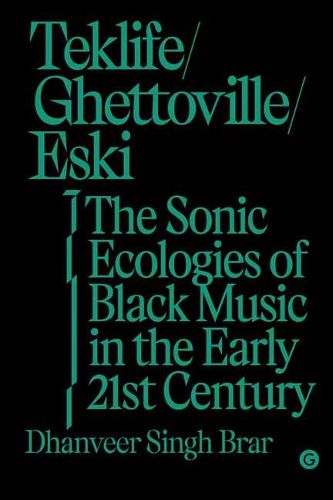Readings Newsletter
Become a Readings Member to make your shopping experience even easier.
Sign in or sign up for free!
You’re not far away from qualifying for FREE standard shipping within Australia
You’ve qualified for FREE standard shipping within Australia
The cart is loading…






How black electronic dance music makes it possible to reorganize life within the contemporary city.
How black electronic dance music makes it possible to reorganize life within the contemporary city.
Teklife, Ghettoville, Eski argues that Black electronic dance music produces sonic ecologies of Blackness that expose and reorder the contemporary racialization of the urban–ecologies that can never simply be reduced to their geographical and racial context. Dhanveer Singh Brar makes the case for Black electronic dance music as the cutting-edge aesthetic project of the diaspora, which due to the music’s class character makes it possible to reorganize life within the contemporary city.
Closely analysing the Footwork scene in South and West Chicago, the Grime scene in East London, and the output of the South London producer Actress, Brar pays attention to the way each of these critically acclaimed musical projects experiment with aesthetic form through an experimentation of the social. Through explicitly theoretical means, Teklife, Ghettoville, Eski foregrounds the sonic specificity of 12 records, EPs, albums, radio broadcasts, and recorded performances to make the case that Footwork, Grime, and Actress dissolve racialized spatial constraints that are thought to surround Black social life.
Pushing the critical debates concerning the phonic materiality of blackness, undercommons, and aesthetic sociality in new directions, Teklife, Ghettoville, Eski rethinks these concepts through concrete examples of contemporary black electronic dance music production that allows for a theorization of the way Footwork, Grime, and Actress have–through their experiments in blackness–generated genuine alternatives to the functioning of the city under financialized racial capitalism.
$9.00 standard shipping within Australia
FREE standard shipping within Australia for orders over $100.00
Express & International shipping calculated at checkout
Stock availability can be subject to change without notice. We recommend calling the shop or contacting our online team to check availability of low stock items. Please see our Shopping Online page for more details.
How black electronic dance music makes it possible to reorganize life within the contemporary city.
How black electronic dance music makes it possible to reorganize life within the contemporary city.
Teklife, Ghettoville, Eski argues that Black electronic dance music produces sonic ecologies of Blackness that expose and reorder the contemporary racialization of the urban–ecologies that can never simply be reduced to their geographical and racial context. Dhanveer Singh Brar makes the case for Black electronic dance music as the cutting-edge aesthetic project of the diaspora, which due to the music’s class character makes it possible to reorganize life within the contemporary city.
Closely analysing the Footwork scene in South and West Chicago, the Grime scene in East London, and the output of the South London producer Actress, Brar pays attention to the way each of these critically acclaimed musical projects experiment with aesthetic form through an experimentation of the social. Through explicitly theoretical means, Teklife, Ghettoville, Eski foregrounds the sonic specificity of 12 records, EPs, albums, radio broadcasts, and recorded performances to make the case that Footwork, Grime, and Actress dissolve racialized spatial constraints that are thought to surround Black social life.
Pushing the critical debates concerning the phonic materiality of blackness, undercommons, and aesthetic sociality in new directions, Teklife, Ghettoville, Eski rethinks these concepts through concrete examples of contemporary black electronic dance music production that allows for a theorization of the way Footwork, Grime, and Actress have–through their experiments in blackness–generated genuine alternatives to the functioning of the city under financialized racial capitalism.